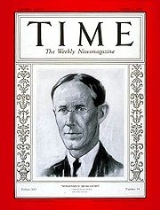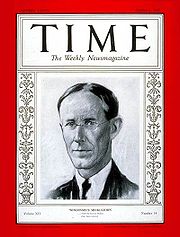
Alexander Meiklejohn
Encyclopedia

Philosophy
Philosophy is the study of general and fundamental problems, such as those connected with existence, knowledge, values, reason, mind, and language. Philosophy is distinguished from other ways of addressing such problems by its critical, generally systematic approach and its reliance on rational...
, university administrator, and free-speech advocate. He served as dean of Brown University
Brown University
Brown University is a private, Ivy League university located in Providence, Rhode Island, United States. Founded in 1764 prior to American independence from the British Empire as the College in the English Colony of Rhode Island and Providence Plantations early in the reign of King George III ,...
and president of Amherst College
Amherst College
Amherst College is a private liberal arts college located in Amherst, Massachusetts, United States. Amherst is an exclusively undergraduate four-year institution and enrolled 1,744 students in the fall of 2009...
.
Life and career
Meiklejohn was born in RochdaleRochdale
Rochdale is a large market town in Greater Manchester, England. It lies amongst the foothills of the Pennines on the River Roch, north-northwest of Oldham, and north-northeast of the city of Manchester. Rochdale is surrounded by several smaller settlements which together form the Metropolitan...
, Lancashire
Lancashire
Lancashire is a non-metropolitan county of historic origin in the North West of England. It takes its name from the city of Lancaster, and is sometimes known as the County of Lancaster. Although Lancaster is still considered to be the county town, Lancashire County Council is based in Preston...
, England
England
England is a country that is part of the United Kingdom. It shares land borders with Scotland to the north and Wales to the west; the Irish Sea is to the north west, the Celtic Sea to the south west, with the North Sea to the east and the English Channel to the south separating it from continental...
of Scottish descent, being the youngest of eight sons. When he was eight, the family moved to the United States, settling in Rhode Island
Rhode Island
The state of Rhode Island and Providence Plantations, more commonly referred to as Rhode Island , is a state in the New England region of the United States. It is the smallest U.S. state by area...
. Family members pooled their money to send him to school. He earned his bachelor's and master's degrees at Brown and completed his doctorate
Doctorate
A doctorate is an academic degree or professional degree that in most countries refers to a class of degrees which qualify the holder to teach in a specific field, A doctorate is an academic degree or professional degree that in most countries refers to a class of degrees which qualify the holder...
in philosophy at Cornell
Cornell University
Cornell University is an Ivy League university located in Ithaca, New York, United States. It is a private land-grant university, receiving annual funding from the State of New York for certain educational missions...
in 1897. At Brown he was a member of Theta Delta Chi
Theta Delta Chi
Theta Delta Chi is a social fraternity that was founded in 1847 at Union College. While nicknames differ from institution to institution, the most common nicknames for the fraternity are Theta Delt, Thete, TDX, and TDC. Theta Delta Chi brothers refer to their local organization as Charges rather...
.
In the same year, he began teaching at Brown. In 1901 he became dean of the school, a position he held for twelve years. The first-year advising program at Brown now bears his name. From 1913 to 1923 he was president of Amherst College. From there he went to the University of Wisconsin–Madison
University of Wisconsin–Madison
The University of Wisconsin–Madison is a public research university located in Madison, Wisconsin, United States. Founded in 1848, UW–Madison is the flagship campus of the University of Wisconsin System. It became a land-grant institution in 1866...
, where he taught and set up an experimental college. He then, in 1938, joined the School of Social Studies in San Francisco, where he was involved with adult education
Adult education
Adult education is the practice of teaching and educating adults. Adult education takes place in the workplace, through 'extension' school or 'school of continuing education' . Other learning places include folk high schools, community colleges, and lifelong learning centers...
. His books span the period from 1920 to 1960.
On free speech
Meiklejohn is known as an advocate of first-amendmentFirst Amendment to the United States Constitution
The First Amendment to the United States Constitution is part of the Bill of Rights. The amendment prohibits the making of any law respecting an establishment of religion, impeding the free exercise of religion, abridging the freedom of speech, infringing on the freedom of the press, interfering...
freedoms and was a member of the National Committee of the American Civil Liberties Union
American Civil Liberties Union
The American Civil Liberties Union is a U.S. non-profit organization whose stated mission is "to defend and preserve the individual rights and liberties guaranteed to every person in this country by the Constitution and laws of the United States." It works through litigation, legislation, and...
(ACLU). Meiklejohn is one of the most notable proponents of the link between freedom of speech
Freedom of speech
Freedom of speech is the freedom to speak freely without censorship. The term freedom of expression is sometimes used synonymously, but includes any act of seeking, receiving and imparting information or ideas, regardless of the medium used...
and democracy
Democracy
Democracy is generally defined as a form of government in which all adult citizens have an equal say in the decisions that affect their lives. Ideally, this includes equal participation in the proposal, development and passage of legislation into law...
. He argues that the concept of democracy is that of self-government by the people. For such a system to work an informed electorate is necessary. In order to be appropriately knowledgeable, there must be no constraints on the free flow of information and ideas. According to Meiklejohn, democracy will not be true to its essential ideal if those in power are able to manipulate the electorate by withholding information and stifling criticism. Meiklejohn acknowledges that the desire to manipulate opinion can stem from the motive of seeking to benefit society. However, he argues, choosing manipulation negates, in its means, the democratic ideal. Eric Barendt
Eric Barendt
Eric M. Barendt is the Goodman Professor of Media Law at University College London. After graduating BCL and MA at Oxford, Barendt was called to the Bar at Gray's Inn. He began lecturing in law as a fellow at St Catherine's College, Oxford in 1971...
has called the defence of free speech on the grounds of democracy "probably the most attractive and certainly the most fashionable free speech theory in modern Western democracies".
Although Meiklejohn died in 1964 his ideas are still informing the ongoing discussion about how the United States "experiment" in democracy is best understood. This is happening in a very pointed way in early twenty-first centuary attempts to regulate the ways in which campaigns for political office are financed, and reactions to such attempts by the Supreme Court of the United States. Justice Stephen G. Breyer, in particular, has adopted Meiklejohn's interpretation of the First Amendment to the United States Constitution. In Jeremiah Nixon v. Shrink Misouri et al., 528 U.S. 377 (2000), at 401, Justice Breyer (joined by Justice Ruth Bader Ginsburg) wrote a concurring opinion in support of such regulation. In response to protestations that such laws violate citizen's rights to free speech, Breyer held that there were free spech arguments on both sides of the issue. He said that properly framed regulations limiting monetary contributions could substantially expand the opportunity for freedom of expression rather than limit it. He pointed out that the integrity of the electoral process needs to be maintained since that is the means by which a free society translates political advocacy into concrete political action, and that regulating the financing of political campaigns is integral to that advocacy. In doing so Breyer cited Meiklejohn's interpretation of the First Amendment which gives emphasis to public need rather than individual prerogative. Arguably at least, the issues in cases like this go to the heart of any discussion about what the United Staes democracy is, or ought to be, because such discussions will involve, not only the way money is related to speech and the nature of partisan political debate, but also to the matter of government regulations and how much attention should be given to collective needs as compared with individual ones - all of which were central to Meiklekohn's concern about the very meaning of freedom. See Eugene H. Perry, A Socrates for all Seasons - Alexannder Meiklejohn and Deliberative Democracy, (Bloomington,Indiana: iUniverse Press, 2011).
Legacy and recognition
In 1945 he was a U.S. delegate to the founding meeting of UNESCOUNESCO
The United Nations Educational, Scientific and Cultural Organization is a specialized agency of the United Nations...
in London. The American Association of University Professors
American Association of University Professors
The American Association of University Professors is an organization of professors and other academics in the United States. AAUP membership is about 47,000, with over 500 local campus chapters and 39 state organizations...
(AAUP) established the Alexander Meiklejohn Freedom Award to honor his work. He received the Rosenberger Medal in 1959. Meiklejohn was selected by John F. Kennedy
John F. Kennedy
John Fitzgerald "Jack" Kennedy , often referred to by his initials JFK, was the 35th President of the United States, serving from 1961 until his assassination in 1963....
to receive the Presidential Medal of Freedom
Presidential Medal of Freedom
The Presidential Medal of Freedom is an award bestowed by the President of the United States and is—along with thecomparable Congressional Gold Medal bestowed by an act of U.S. Congress—the highest civilian award in the United States...
, which was presented by Lyndon B. Johnson
Lyndon B. Johnson
Lyndon Baines Johnson , often referred to as LBJ, was the 36th President of the United States after his service as the 37th Vice President of the United States...
shortly after Kennedy's death.
The Meiklejohn Advising Program is Brown University's advising program for incoming first-year students. Meiklejohn Advisors (known as Meiklejohns for short) are student advisors who are paired with each first-year, along with a faculty advisor, to provide academic advice and help the transition to college.
The University of Wisconsin–Madison's Meiklejohn House (home to the Integrated Liberal Studies program) and Alexander Meiklejohn Residential College continues to espouse the ideals of Meiklejohn's experimental college by engaging in interdisciplinary liberal education.
List of writings
- The Liberal College
- Freedom and the College
- The Experimental College, 1932 (full text online)
- Free Speech and its Relation to Self-Government, 1948 (full text online)
- Political Freedom; the Constitutional Powers of the People
External links
- Alexander Meiklejohn, Philosopher, Dean, Advocate of Free Speech
- Alexander Meiklejohn and the Experimental College
- Alexander Meiklejohn Papers at Amherst College Archives
- Meiklejohn Advising - Brown University
- The Experimental College (1932), by Alexander Meiklejohn. From the University of Wisconsin–Madison Digital Collections Center.
- Free Speech and its Relation to Self-government, by Alexander Meiklejohn. From the University of Wisconsin–Madison Digital Collections Center.
- Remembering Alexander Meiklejohn A tribute by Joseph Tussman, a former student

